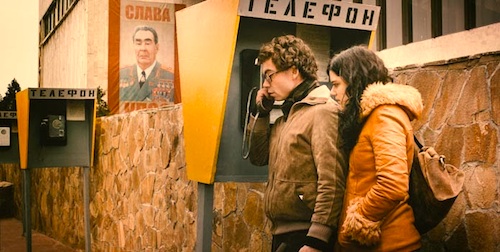By Joe Bendel. As a matter of policy, the Soviets automatically denied all requests from the so-called “Refuseniks” to immigrate to Israel, often spuriously claiming they were irreplaceable specialists (who were then duly fired from their positions). As it happens, Victor Rybak really is a highly respected authority in the field of physics, much like Sakharov. His uphill battle to join his wife in Israel will profoundly affect two young French cousins in Anne Weil & Philippe Kotlarski’s Friends from France, the opening night selection of the 2014 New York Jewish Film Festival, co-presented by the Jewish Museum and the Film Society of Lincoln Center.
Carole Brikerman is a passionate Zionist, who supports the Refuseniks’ aspirations for Israel. Jérôme Berkowitz is passionate about his cousin Brikerman. Despite his mixed feelings, Berkowitz joins his cousin on a leftist guided tour of Odessa. Pretending to be newlyweds, they will secretly visit Jewish dissidents, bringing smuggled care packages and offering moral support. Berkowitz resents what he considers Brikerman’s Zionist proselytizing, while struggling with his arousal from their intimate proximity. However, when they pay a call on Rybak, Berokwitz meets someone far more cynical than himself.
Rybak has good reason to be jaded. He endured constant torture in a Communist mental hospital, intended to force him to denounce his beloved wife, who had successfully reached Israel ahead of him. While imprisoned, he secretly maintained a diary. Not only did he document the systemized abuse and summary executions, he also included deeply personal passages of erotic longing, meant solely for her eyes.
Even in translated subtitles, the words of Rybak’s diary ring with truth and poetry. They are easily the most compelling element of Weil & Kotlarski’s screenplay. It is easy to understand why Brikerman’s network would want to publish it and why the Soviets would be determined to prevent such an embarrassment. They also open a deep window into the Refusenik physicist’s soul. For all his exterior gruffness, Rybak is a haunted romantic at heart.
Vladimir Fridman is simply extraordinary as Rybak. It is an acutely human and humane portrayal, conveying all his messy complications and understandable bitterness. It is only January, but Fridman’s work should be noted for year-end lists. He instills Friends with power and integrity whenever he is on-screen.

In contrast, Soko and Jérémie Lippmann simply are not in the same league. Still, much like his character, Lippmann slowly sneaks up on viewers, developing a distinct presence and persona down the stretch. Evidently, Soko is France’s current “It Girl,” so it is nice she wants to appear in a film like this. At least she is more engaging than in the grossly over-rated Augustine. She does not undermine any of the proceedings, but it is hard to see her in the way other characters do.
Weil & Kotlarski vividly capture oppressive vibe of Communist era Odessa. At times Friends functions as a surprisingly good Cold War thriller. It probably holds some sort of distinction as a film noticeably critical of both the Soviet Union and the Zionist movement. Yet, its sharpest, most illuminating observations involve the hypocrisy of the leftwing tourists. Ostensibly on a personal mission of solidarity, they are clearly fearful of the Party’s apparatus of control—with very good reason. Smart, literate, and sometimes quite moving, Friends from France is a strong way to open this year’s NYJFF. Highly recommended, it screens twice this coming Wednesday (1/8) at the Walter Reade Theater.
LFM GRADE: A-
Posted on January 3rd, 2014 at 10:31am.